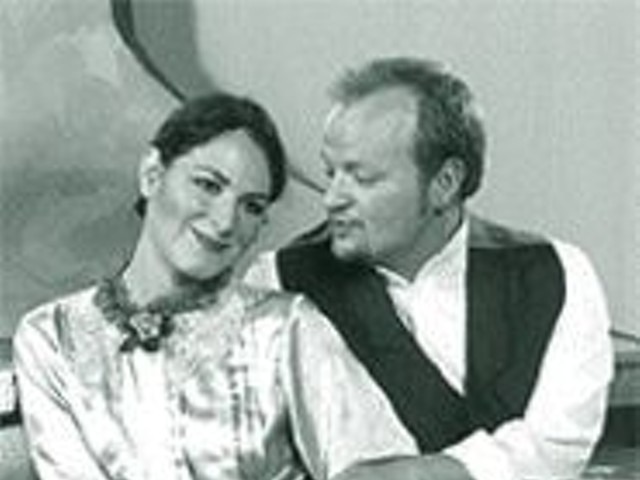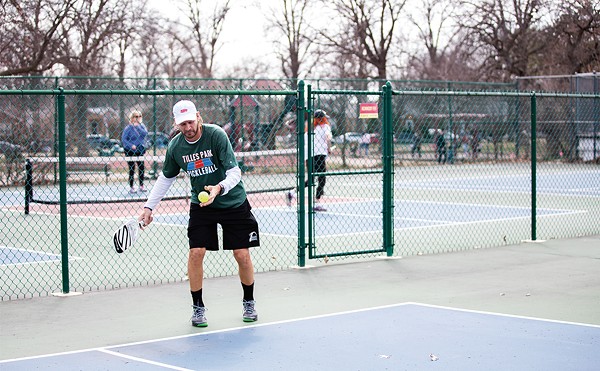This book is a damn good read. Clewell really has mastered the voice of the petty gangster with a heart -- if not of gold, certainly of something other than evil. Not that his Ruby is a gangster in the Tony Soprano sense. He doesn't whack guys (not until Oswald), mark turf or run protection rings. In fact, though he owns a club with dancing girls, he doesn't even pimp out his talent. He tells them: "You've heard of selling the sizzle,/not the steak? Be sure you're only sizzle. Nothing but."
Though he does pay off the cops, and he takes directions from the big mob boys such as: Shoo off down to Dallas for a while. And then, years later: Go shut up this Oswald creep who accidentally got rounded up by the wrong coppers and looks a little talkative.
Brilliantly, for a story that we know is headed for one of the most dramatic moments in American history, Jack Ruby's America begins with the fussy purchase of some sandwiches. The grub is bound for the station house as a little lubricant for business as usual, but that's not the point of "Jack Ruby Orders the Chicken Salad," the opening poem. The point is Ruby's needy, networking, hustling but decent character. He's running sandwiches for the cops to get "in on the action," sure, but he leaves some change to the girl behind the counter for "something extra: a little bit/of trouble or excitement you don't really need." (There is a touch of autobiographical connection for the poet here, given that the biggest tipper on Clewell's boyhood paper route was a wise guy.)
The opening monologue also establishes Ruby as a philosopher, of sorts. He sees in his to-go order something more than a happy station house of cops. As he waits to pay, he brags about his knowledge of human nature to the girl behind the counter: "I'm here/to tell you it's not much. I'm talking one sorry load/of chicken salad sandwiches bagged up in the front seat of a car/in the Dallas sun."
There is just enough sweat and grease in this metaphor to believe that it came from a chump club owner like Ruby. And it begins to earn for Clewell his book's title, which clearly wants to expand this story to a larger canvas than Ruby himself. Deftly, the poet doesn't put this sort of grandly perceptive language into Ruby's mouth again until the end, as he lies dying in the hospital, when his spontaneous metaphor is based not on carryout food but on the single most famous object in this particular piece of history: the supposed single assassin's bullet. Ruby has his "own Magic Bullet Theory": "It's the bullet all of us have to bite, sooner or later, like our lives/depend on it -- a kind of making do, getting by this shaky way/or that, even if we'd rather not. It's nothing that goes through us/and comes out clean on the other side."
For a less mature poet, or one less interested in the shabby human details behind such profound truths, that speech would be the climax of the book. But Clewell has way more sense than that. He has the rambling, dying small-timer (who suddenly became a big-timer, but the wrong kind) return to thoughts of something that he thinks he can control -- carryout sandwiches, of course, and he sends his sister out to get them with instructions. Very detailed instructions, which conclude: "Only make it sound better, OK? Make me sound better. Not so small." You can hear the death rattle, and the dignity, in that.
And, of course, you can hear the historical Jack Ruby crying out to the poet, who has answered this cry with class. Ruby is "not so small" in Clewell's book, or if he is, these poems suggest, then so we all are. We're just dodging different bullets, feeding other faces with different crummy carryout. If we feel humbled the way this poem wants us to feel, then Ruby's advice to "the new girl" who has come to sell her sizzle dancing at his club starts to sounds pretty good:
"Let's face it: The music/isn't much. But it's all yours. Do what you can."
David Clewell deserves accolades and superlatives for this work. You could say that no one is writing better poetic monologues right now; compare, for example, Richard Howard's Trappings, a book by a much more lauded and better-connected poet. Its monologues have a more familiar poetic subject, John Milton, but they are, by comparison, a bit precious. Really, though, it unfairly limits the potential audience of Jack Ruby's America to situate it among its peers in contemporary poetry. You don't have to haunt the poetry aisles or open mics to like this book. All you need is an ear for human speech, a chip on your shoulder, a curiosity about Camelot, a sympathy for gangsters, a weakness for heartbreak and chicken-salad sandwiches.
To order copies of Jack Ruby's America, send a check for $12 (per book) plus $3 shipping and handling (total order, regardless of number of books) to Garlic Press, 483 S. Kirkwood Rd., No. 13, St. Louis, MO 63122. Make check payable to Peter Genovese.





